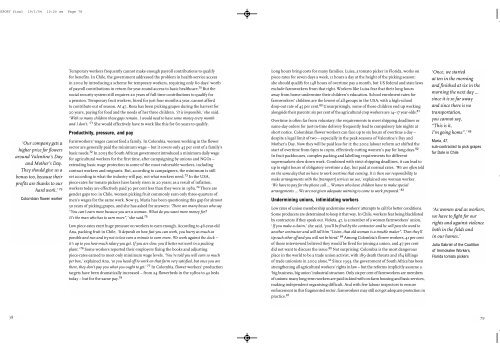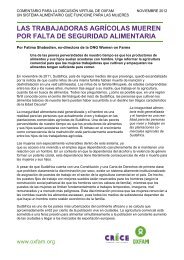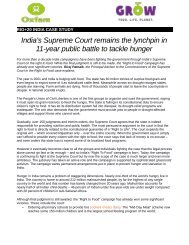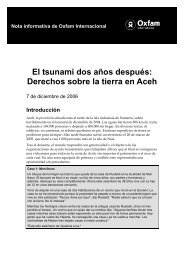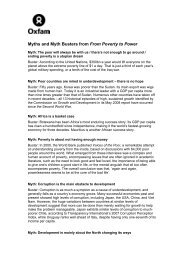Trading Away Our Rights - Oxfam International
Trading Away Our Rights - Oxfam International
Trading Away Our Rights - Oxfam International
You also want an ePaper? Increase the reach of your titles
YUMPU automatically turns print PDFs into web optimized ePapers that Google loves.
EPORT final 19/1/04 10:20 am Page 78‘<strong>Our</strong> company gets ahigher price for flowersaround Valentine’s Dayand Mother’s Day.They should give us abonus too, because theirprofits are thanks to ourhard work.’ 79Colombian flower workerTemporary workers frequently cannot make enough payroll contributions to qualifyfor benefits. In Chile, the government addressed the problem in health-service accessin 2002 by introducing a scheme for temporary workers, requiring only 60 days’ worthof payroll contributions in return for year-round access to basic healthcare. 70 But thesocial security system still requires 20 years of full-time contributions to qualify fora pension. Temporary fruit workers, hired for just four months a year, cannot affordto contribute out of season. At 47, Rosa has been picking grapes during the harvest for20 years, paying for food and the needs of her three children. ‘It is impossible,’ she said.‘With so many children those gaps remain. I would need to have some money every monthand I don’t.’ 71 She would effectively have to work like this for 60 years to qualify.Productivity, pressure, and payFarmworkers’ wages cannot feed a family. In Colombia, women working in the flowersector are generally paid the minimum wage – but it covers only 45 per cent of a family’sbasic needs. 72 In 2003 the South African government introduced a minimum daily wagefor agricultural workers for the first time, after campaigning by unions and NGOs –extending basic wage protection to some of the most vulnerable workers, includingcontract workers and migrants. But, according to campaigners, the minimum is stillset according to what the industry will pay, not what workers need. 73 In the USA,piece-rates for tomato pickers have barely risen in 20 years; as a result of inflation,workers today are effectively paid 30 per cent less than they were in 1980. 74 There aregender gaps too: in Chile, women picking fruit commonly earn only three-quarters ofmen’s wages for the same work. Now 55, Maria has been questioning this gap for almost30 years of picking grapes, and she has asked for answers: ‘There are many bosses who say“You can’t earn more because you are a woman. What do you want more money for?It’s the man who has to earn more”,’ she said. 75Low piece-rates exert huge pressure on workers to earn enough. According to 46-year-oldAna, packing fruit in Chile, ‘It depends on how fast you can work, you hurry as much aspossible and run and try not to lose even a minute to earn more. We work against the clock –it’s up to you how much salary you get. If you are slow, you’d better not work in a packingplant.’ 76 Some workers reported their employers fixing the books and adjustingpiece-rates earned to meet only minimum wage levels. ‘You’re told you will earn so muchper box,’ explained Ana, ‘so you head off to work on that farm very satisfied, but once you arethere, they don’t pay you what you ought to get.’ 77 In Colombia, flower workers’ productiontargets have been dramatically increased – from 24 flowerbeds in the 1980s to 42 bedstoday – but for the same pay. 78Long hours bring costs for many families. Luisa, a tomato picker in Florida, works onpiece-rates for seven days a week, 11 hours a day at the height of the picking season:she should qualify for 148 hours of overtime pay a month, but US federal and state lawsexclude farmworkers from that right. Workers like Luisa fear that their long hoursaway from home undermine their children’s education. School enrolment rates forfarmworkers’ children are the lowest of all groups in the USA, with a high-schooldrop-out rate of 45 per cent. 80 Unsurprisingly, some of those children end up workingalongside their parents: six per cent of the agricultural crop workers are 14–17 year-olds. 81Overtime is often far from voluntary: the requirements to meet shipping deadlines orsame-day orders for just-in-time delivery frequently lead to compulsory late nights atshort notice. Colombian flower workers can face up to six hours of overtime a day –despite a legal limit of two – especially in the peak seasons of Valentine’s Day andMother’s Day. Now they will be paid less for it: the 2002 labour reform act shifted thestart of overtime from 6pm to 10pm, effectively cutting women’s pay for long days. 82In fruit packhouses, complex packing and labelling requirements for differentsupermarkets slow down work. Combined with strict shipping deadlines, it can lead toup to eight hours of obligatory overtime a day, but paid at normal rates. ‘We are often toldon the same day that we have to work overtime that evening. It is then our responsibility tomake arrangements with the [transport] services we use,’ explained one woman worker.‘We have to pay for the phone call … Women who have children have to make specialarrangements … We are not given adequate warning to come to work prepared.’ 83Undermining unions, intimidating workersLow rates of union membership undermine workers’ attempts to call for better conditions.Some producers are determined to keep it that way. In Chile, workers fear being blacklistedby contractors if they speak out. Violeta, 47, is a member of a women farmworkers’ union.‘If you make a claim,’ she said, ‘you’ll be fired by the contractor and he will pass the word toanother contractor and will tell him “Listen, that old woman is a trouble maker”. Then they’lltip each other off and you will not be hired.’ 84 Among Colombia’s flower workers, 41 per centof those interviewed believed they would be fired for joining a union, and 47 per centdid not want to discuss the issue. 85 Not surprising: Colombia is the most dangerousplace in the world to be a trade union activist, with 189 death threats and 184 killingsof trade unionists in 2002 alone. 86 Since 1993, the government of South Africa has beenstrengthening all agricultural workers’ rights in law – but the reforms implicitly assume a‘big business, big union’ industrial structure. Only six per cent of farmworkers are membersof unions: many long-term workers are paid in-kind with on-farm housing and basic services,making independent organising difficult. And with few labour inspectors to ensureenforcement in this fragmented sector, farmworkers may still not get adequate protection inpractice. 87‘Once, we startedat ten in the morningand finished at six in themorning the next day …since it is so far awayand since there is notransportation,you cannot say,“This is it,I’m going home”.’ 88Maria, 47,sub-contracted to pick grapesfor Dole in Chile‘As women and as workers,we have to fight for ourrights and against violenceboth in the fields andin our homes.’Julia Gabriel of the Coalitionof Immokalee Workers,Florida tomato pickers7879


